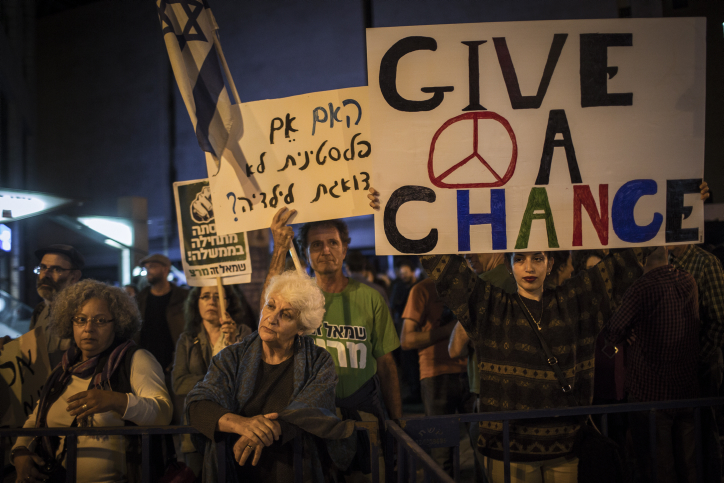The occupation is disastrous first and foremost for Palestinians, but it is also disastrous for the Jewish people in Israel. Left-wing politics cannot be based solely on solidarity with the Other.
By Uri Weltmann
There are left-wing voices in Israel who believe that the very foundation of Israeliness has become inextricably intertwined with the country’s occupation of the Palestinians. One such view, expressed by Inna Michaeli in an oped in these pages, goes so far as to argue that “the end of the occupation will bring about the end of Israel.” Such voices are effectively abandoning the worldview according to which the struggle for peace is a struggle for Israeli society itself, perhaps inadvertently aligning themselves with the radical right in Israel, which also sees the fate of the State of Israel as necessarily tied to its control over the Palestinians.
Those are not left-wing politics.
Left-wing politics is a politics based not only on an abstract feeling of solidarity with the Other, but one that tries to enlist the public to fight for its own concrete interests, i.e. for itself. Our discourse on the struggle against racism or the occupation must be based on an understanding that those phenomena are destructive for Israeli society in the broadest sense, and not only for their immediate victims (Arab-Palestinian citizens of Israel or Arab-Palestinians in the occupied territories).
Sure, part of the Israeli public can be enlisted in the struggle against, for example, the settlements, solely on the understanding that they are immoral and unjust. That group of people must be in our camp, but we can’t settle with having only them by our side. It could be that there is a much broader group of people that we could bring into such a struggle if we manage to convince them that the settlements and the occupation are disastrous, first and foremost for the Palestinian people, but that also disastrous for the Jewish people in Israel.
The absence of that discourse must be corrected, not only because it would sharpen the Left’s political message, but because it carries the potential to bring more people into the struggle. At the end of the day we’re not trying to bring the “Old Left” (older, middle class, liberal Ashkenazis, who have been going to Peace Now rallies since the 1980s) into our tent; we must have a message that is relevant for the broader population. We’re not trying to build a minority; we’re trying to reach the majority of our society.
It is important to project that our message of peace and equality is one that reflects the needs of the entire population of Israel. It is vital to demonstrate that these are patriotic values, not the sense that the country’s right-wing leadership understands the word, but in a deeper sense — these are values that serve the true national interests of both peoples that live here.
One flag, three masts
A palpable example of the convergence of left-wing values and the interests of the broader public can be seen in the fact that every time it becomes apparent that the government’s socio-economic policies are harming the public, the number of provocations the state initiates in the occupied territories seems to multiply, usually followed by a new barrage of anti-democratic legislation in the Knesset. If previous governments didn’t seem to go quite as wild with racist legislation as the current one, it is only because their plans to ravage our natural resources and bank accounts weren’t quite as ravenous as the Netanyahu government’s.
At the same time that the current government was advancing its plan to sell off a trillion shekel’s worth of Israel’s natural gas resources to tycoons, it was also pushing through legislation that would force representatives of human rights NGOs to wear special tags in the Knesset. Now the government is trying to pass a socially disastrous two-year budget, while at the same time threatening the director of B’Tselem, attempting to revoke Amnesty International’s non-profit tax status, and pull support for Israel Social TV.
The goal is to distract the public, but also to divert the attention and resources of all those activists and organizations trying to effect real change. The more the government wants to rob us, the more anti-democratic legislation it proposes, and the more it tries to scare us with external threats near and far (the Palestinians and Iran, respectively).
In order to build a real peace movement in Israel, we must also build a movement for true equality, and we must build the broadest possible movement for social justice. Those are not three different flags flying on three separate masts, one of which is raised while the others are lowered. They are three integral parts of the larger struggle to transform this land into a place that is good for all who live here, which is the most important struggle if we are all going to live here together.
Uri Weltmann is an Israeli peace activist and serves on the Executive Board of the Emil Touma Institute for Palestinian and Israeli Studies. This article was first published in Hebrew on Local Call.

